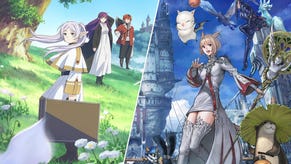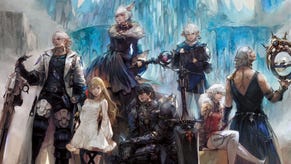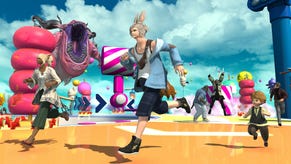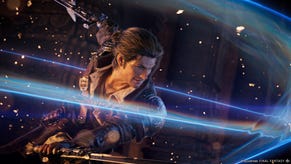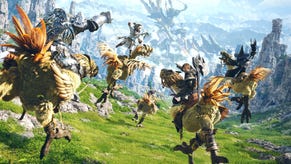A Realm Reborn, the MMO for MMO Idiots Like Me
An MMO novice talks to Naoki Yoshida, the man tasked with reinventing Final Fantasy XIV from the ground up, and likes what he hears.
This article first appeared on USgamer, a partner publication of VG247. Some content, such as this article, has been migrated to VG247 for posterity after USgamer's closure - but it has not been edited or further vetted by the VG247 team.
I've never played a massively multiplayer RPG. I barely ever play multiplayer games at all, to be honest. But Final Fantasy XIV has me intrigued. The initial launch of the game was wildly unpopular, a borderline disaster for Square Enix. But a funny thing happened: Instead of abandoning it as happens with so many botched MMOs, they buckled down and decided to fix it.
The upcoming expansion, A Realm Reborn, isn't your typical MMO add-on. It's not just new quests or an added faction or whatever; it completely rebuilds the game from the ground up. The original FFXIV came to an end last year with a massive system-wide apocalypse, and A Realm Reborn drops players into its aftermath. It's kind of like the division between the Worlds of Balance and Ruin in Final Fantasy VI, except that this time Square is hoping to find balance from the rubble of ruin.
I had a lengthy conversation at E3 with Naoki Yoshida, the man with the unenviable task of salvaging a vast project gone awry, and I found him to be both passionate about his work and keenly aware that the hardcore MMO fan is in the minority.
USgamer: I'm one of the people you're reaching out to with this game. I have no experience with MMOs, but I've played all the Final Fantasy games besides XI. In addition to the general overview, what is it about Final Fantasy XIV that you think would appeal to someone like me, who's followed the series, but never plays online RPGs?
Naoki Yoshida: Your situation, being a console player who's played all the FFs except XI and not being an MMO player, is pretty much what we have in Japan. A lot of Japanese players are console only and they know the series only through the consoles. Again, as a company, we can go out and say, "Yes, this is a great game, you should play it," but that's the thing. Because it's an MMO, it can be very imposing.
Someone who's never played an MMO before will have this image that it's very complex, that it has a very niche following, that it's very different from the console games that they're used to. That's why we're releasing the trailer that we released a couple of days ago. It's showing that the graphics level you expect from a console game is there. The level of story, the voice acting, we have that as well. The type of combat is similar to more modern Final Fantasy games.
"In this day and age, it's all about the communication between players. You're going to listen to your friend, rather than listen to a big corporation."
We're showing people that yes, even though this is an MMO game, we have a Final Fantasy game here. And then we're giving them the opportunity to try it out with the beta test that's going to be starting in a couple of days. If you're interested, what we've shown you is that we don't just have an MMO. We have a Final Fantasy game. Then you can get in the beta test to try it out and see if you like it, and then go from there. Rather than us telling you, it's you trying it out and seeing if it's something you want to play.
This time, one of the other features that we've introduced for players who are more used to offline and console games, we've made sure that a lot of our main story can be covered solo. You don't have to have a party. You can go in and play by yourself. We've made sure there are a lot of different systems that can help a solo player. You can see that main story by yourself.
We do know that a lot of people are going to be wary. Here's an MMO and they're going to think, "This is way too much for me. I don't know about this." Rather than us telling them, "No, it's okay," we'd rather have as many people as possible try out the beta or try out the original launch. Because MMOs are based on community, you get enough people playing your game and thinking it's great, they'll tell their friends. If you have a friend tell you, "Yeah, I went in thinking it was going to be like this, but actually it was pretty easy. There's a lot of stuff that might be good for someone who plays console games. You don't have to be in a party all the time..."
In this day and age, it's all about the communication between players. They are our best marketing asset. They're the ones who are going to tell other players, "You should play this game." You're going to listen to your friend, rather than listen to a big corporation.
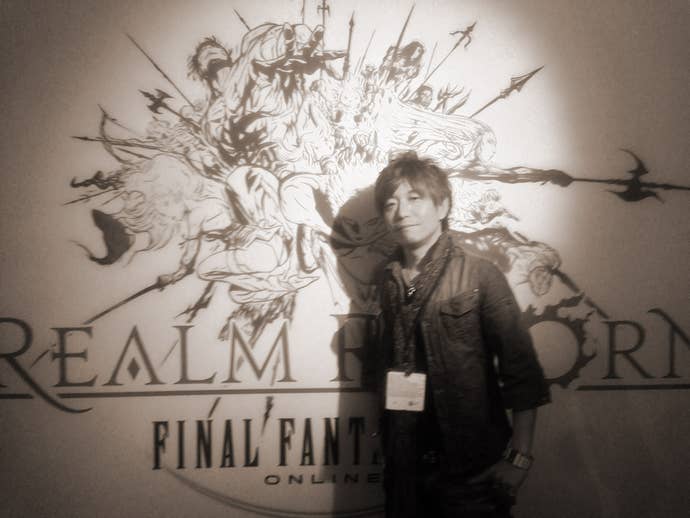
USG: It seems to me that creating and balancing an MMO that works the way it's supposed to, something that you can play and invest in for a very long time, might be the most difficult balancing act in video games. The idea is that you play for a long time, and so traditionally MMOs have been very slow. It takes a long time to build up your level. Certainly Final Fantasy XI had a reputation for being like that. But at the same time, if you make things too easy and transparent, there's no durability for the game. BioWare discovered that with The Old Republic. People played it and enjoyed it for a couple of months and then stopped playing. There was a huge drop-off. What's your approach to creating that balance and ensuring that people will want to play the game for a long time? So it's not too difficult for them to get into, but they don't end up hitting the level cap in two weeks and going home.
NY: Looking at the current generation of gamers, a lot of them don't want to play something for a long time. The main reason being that there's so much to play. There are so many choices. Not only do you have console games, you have handheld games, and so many other things to do. Creating a game in this generation that takes a long time to level up in is pretty much nonsense. It's not what this generation of players wants.
For ARR, the level cap is going to be level 50 to start the game. We don't want players to have to spend a lot of time getting to level 50. The reason behind this is that we believe the game up to level 50 is basically your tutorial. The real game begins from level 50. We have the real challenges begin there. We have a lot of end content that we've already prepared to be ready at the launch of the game.
"One of the reasons that The Old Republic tripped up was because BioWare didn't have endgame content prepared in time. We hope to have a lot of end content ready."
One of the reasons that Star Wars maybe tripped up a bit was because [BioWare] didn't have that end content prepared in time. They had to make updates, but players got to the end too quickly and they didn't have that ready. We hope to have a lot of end content ready. We also have the schedule set for even more end content. We can keep updating things. Because we have that long schedule, we know what's coming and we know what we have to have ready. We believe that, yes, even though it's going to be easier to get to that level cap than it was in FFXI, from there we'll have a lot of content ready and we'll be adding a lot more in the near future as well.
USG: When you hit the level cap, you say that the real game begins. Besides just seeing the content, though, what motivation is there for the player to keep going when they can no longer level up? What is it that will motivate players to go beyond level 50? For traditional RPG players, a lot of the motivation for playing an RPG is that constant sense of progression and always getting stronger, always learning new skills.
NY: That's a difficult question. We understand that for a lot of console gamers out there, leveling is a very important thing. But we want them to know that, again, it's not always just about your character level, but being able to experience new things. When you get to level 50, the things you'll be able to do... The story will continue, but to be able to continue the story, you'll need to become more powerful in different ways.
For example, getting better gear. Even though you're level 50, you'll get better gear that will help you handle these challenges. To get that gear, you'll have to go through new quests and new dungeons, and that will in turn help you attack these new challenges.
Again, we understand that some people will get to level 50 and think, "Okay, I'm done." You can't retain all of those guys. But what you can do to retain some of them is to show them that, yeah, you can get to level 50, but there are still new challenges that await you and new things that you can do.
One way to think about it is like this. You go through the game. You get to level 50. You have the final main scenario battle with the enemy from the Empire and then you kill him. But once you kill him, the primal Bahamut is released, and he's flying over the world, raining his fire down. You're level 50, but do you stop there? If players want to stop there, they can stop there, but they have the option to get stronger through your gear and experience more new quests. Level 50 is where the game really starts.
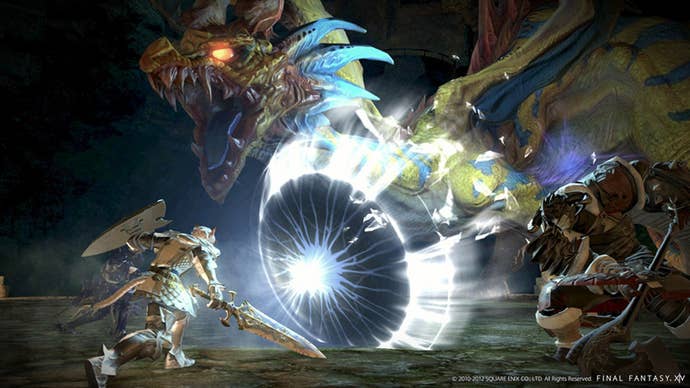
USG: How does the Armory system [which allows players to change their class by equipping different weapons] play into that post-50 gameplay?
NY: The Armory system is more like... instead of it being, "Okay, you've played one job up to level 50, seen all the content, and now you're going to use the armory system to go back to another class from level one again," we want it to be more like something that will fit with what your mood is on that day, how you're feeling, what you want to do, and what you want to come across in the world. You can change it up with a lot of freedom and adapt to your play style at that certain time.
Maybe you've chosen gladiator as your main class and you want to be a tank. But then you go to a new town and you see that this town has a blacksmithing guild. "Oh, well, maybe I want to try that out and make a sword for my gladiator." So you get in there and you change your class and you try out these new quests. Then you see that there are class quests with this new class and you play through some of those. Then you come back to gladiator. It's okay to come around and try different things out and progress with a bunch of them on your way to wherever you're going.
We want to make it so that you can do pretty much everything. You come home from work one day and you're tired, but you want to go into Eorzea because you like the world, but you don't want to deal with talking to other people or doing a quest or anything. So you can change your class to fisherman, get out your line, and throw it in. Watch the sunsets, catch some fish. We want to make it so that the game fits with every lifestyle and every change in mood. That's what the Armory system is for.
"We want to make it so that you can do pretty much everything. Watch the sunsets, catch some fish. We want to make it so that the game fits with every lifestyle and every change in mood."
USG: So, when you start the game, you establish yourself as a set class, and then you can't change that class, is that right? You can only adapt things through the Armory system.
NY: I'll explain a little bit more about how it works. You start the game when you make your character. You choose from one of seven battle classes. Now, because it's an MMO, it's very complex and there are lots of new controls that are very different from a console game, so we let those first 10 levels serve as a tutorial. You can only play as that class for the first 10 levels.
Once you get to level 10, you get permission to talk to other guilds. All you have to do is go to the guild and talk to the guild master, and that unlocks that class. After you get to 10 in your first class, you can change to any other class by speaking to the guild master. Once you've done this, it basically unlocks everything. The first 10 levels of gladiator unlock pugilist, so now you can become a pugilist. All you have to do is change your weapon and you change your class completely.
USG: So there are seven base classes, but then lots of sub-classes?
NY: The seven battle classes are the base classes. As you level up through the class quests, these will unlock the jobs, which are the second tier of classes. For example, one of our jobs is paladin. If you want to become a paladin, first of all you get to level 30 in the gladiator quests, and you also get to level 15 in the marauder quests, which is the axe class. Once you get to 30 and 15 in both of those, it unlocks a job quest for the paladin. If you complete that quest or series of quests, then you unlock the paladin job, which means you can change your class to the paladin job, which is a more defensive-minded battle class.
What I didn't mention before is that there's a total of nine jobs, which are based on these seven classes. In addition to those seven battle classes and nine battle jobs, we have the crafting and gathering classes as well. There's a total of 11 of those. There aren't sub-classes or things that you play as another class. They're actual classes which have their own quest lines as well.
Again, the main thing with the Armory system is that to change classes, all you do is change what you're holding in your hand. If you want to be a gladiator, you pick up a sword and it automatically changes your class to gladiator if you've unlocked that class. If you take up an axe, you become the marauder. It's the same thing with the crafting and gathering classes as well. If you take up a hatchet, you become a botanist and you go out and cut down trees. It's all about the weapon that you're holding. Because it changes just by changing the weapon, it's a very easy system to use.
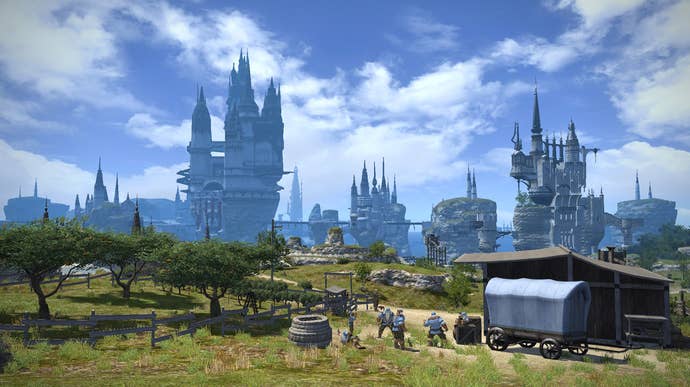
USG: That's kind of the reverse of how it usually works. Usually you pick a class, and then your weapon selection is defined by the class you pick. It sounds like you pick a weapon, and then your class is determined by that weapon.
NY: Yeah. By changing the weapon, you change the role through which you participate in the world.
In our game, we've created a lot of content. If you restrict the player to only seeing a portion of that content because they can only play one class... For a hardcore gamer like myself, it's OK, because I'll just make a bunch of characters and play through with all of them. I have lots of time and I love the game. But for a regular player, they're not going to have the time to do all that, and that's going to create stress, because they're going to want to see parts of the game that other people talk about, but they can't, because they don't have the time to get there.
By having this system, where you have one character that's able to experience all classes without having to create a new character, you give people the opportunity to experience all the content that we make without that much stress. They're happy and we're happy because everything that we've made is being experienced. This kind of goes back to what we talked about before, those people who get to level 50 and then stop playing. By having one character be able to experience everything, rather than having to use multiple characters...
Yes, your character will get to level 50, but then you'll have all these other options as well. You got to 50 using this, but you want to see the other class quests. Our concept is that instead of making leveling slow so that people will take longer to get there, we want to give them more. When we give them more, that's why they'll stay longer. They'll have more fun and they'll want to stay longer.
USG: Is there any advantage to having an alt character in A Realm Reborn, or should people just stick with one?
NY: Yeah, there's really no reason to create another character, unless you wanted to create a character that was a different race, that looks different. That's purely aesthetic.
A lot of people create [alt] characters because they don't have enough inventory space in other characters. They'll create new ones to hold all their stuff. With this, we've made sure that bags have a lot of room in them, so again, there's really no need to create an extra character just to hold more. Inventory becomes a big thing, especially when you have one player playing in so many classes. What are you going to do with all that armor? That armor is clogging up space in your inventory and create a lot of stress, because you might end up carrying around 12 different sets of armor.
What we've done is we've split your inventory into your inventory, and then the Armory chest. The armory chest contains only gear, and each part... You can have up to 25 pieces of each part, whether it be your hand, your head, your body. That's all separate from your inventory, which is going to be your items that you get from gathering or crafting. You can carry around tons of things and not have to worry about, "Okay, I have to do this today, so I have to get all my gear ready so I have enough space."
USG: I know that in a lot of MMOs, people switch characters for story purposes. Like in World of Warcraft; they want to see different storylines between the Alliance and the Horde. In The Old Republic there were the Sith and the Jedi. Is that a factor here, or is there basically just one story?
NY: For the most part, the story is pretty much the same. You'll be able to experience all of the story threads with one character. Because there are three different city-states that you can choose to begin with... The path between about level one through level 15 is going to be distinct because you'll be in one of three different cities. But once you get to level 15, all of those come together into one line. So if you want to really see everything, then you have to play, I guess, the first 15 levels of the different city-states. But again, once you get to level 15, it's all one. For the most part, 90 percent of the story can be experienced with one player.
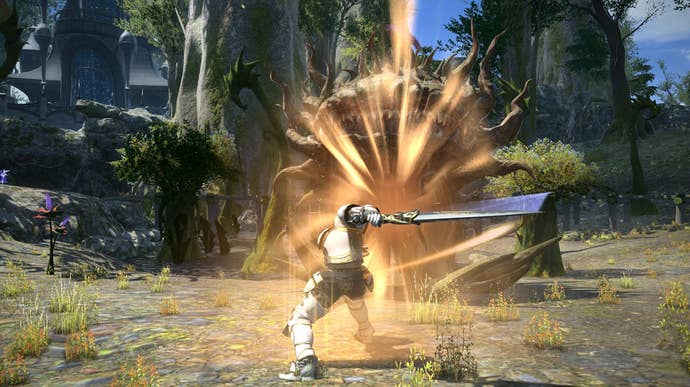
USG: A Realm Reborn basically wipes the slate clean of what's come before with Final Fantasy XIV. As someone who's not that familiar with MMOs, I'd be interested to hear your take on why you needed to take the slash-and-burn approach. Coming in and saying, "This is the direction the game needs to go from this point on." Why go with such a dramatic approach? What did you come in to re-tune, and why not do it more gradually, like the changes that were rolled out for Final Fantasy XI over the years?
NY: You know that I wasn't on the original team, right?
USG: Right.
NY: Back in 2010, before I came on the project, I played the original game. I found that yes, it was very buggy, and there was hardly anything to do. There wasn't very much content. I was thinking, "Okay, if I'm going to be the new producer-director on this project, how can I take this and extend it into a 10-year lifetime?"
We looked over a lot of different things. We looked at the server system. We looked at the graphics. We were thinking, "Can we change this via updates?" We pretty much came to the conclusion that if we wanted to do things like matching servers across worlds, or if we wanted to keep this level of graphics on the PlayStation 3... We found out through our check that these weren't things that could just be fixed through updates. On top of that, we had all the negative feedback. We had lost the trust of players. Can you regain trust by doing a little bit over time?
"We decided that the best thing to do would be to destroy FFXIV and start over again. Why not do it in a Final Fantasy-esque way, by making the story about the world almost being destroyed?"
We decided that the best thing to do would be to destroy it and start over again. That would be the only way to fix it. And not just destroy it, because again, this is a Final Fantasy game. Why not destroy it in a Final Fantasy-esque way, by making the story about the world almost being destroyed by the meteor and then being reborn?
But before destroying it, it's not like we gave up on it completely. We still had that player base that was with us. To destroy it would take time. So what we did was, as everybody knows, we decided to have two different paths – one that's working on a new game, and one that's updating the current game to keep the players that we still have satisfied.
We have gotten tons of feedback from those players that have stuck with us that says, from where the game started when it was released, up until last December when we ended that part and got up to the final part of the story there... They're saying that so much changed. It's gotten so much better. That was one of the ways we were able to regain some of their trust. It's not like we've just destroyed it. We've tried to play out the story of 1.0 and then move into A Realm Reborn.
The biggest thing for us is that what we have to do, our one main duty, is to make an interesting game and get back that trust that we lost. That's the one main thing that we're trying to concentrate on.



